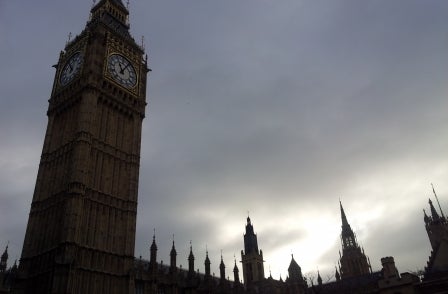
House of Commons Speaker John Bercow has used a loophole in the Freedom of Information Act to suppress reports detailing the scale of alcohol problems at Parliament.
The move, in response to a request by the Press Association, follows a series of incidents that highlighted the issue of alcohol at parliament.
There are around a dozen bars and restaurants on the estate serving politicians, staff and other passholders, with a taxpayer subsidy of £4 million a year.
Former MP Eric Joyce was convicted of assaulting a fellow politician during a brawl in Strangers' Bar in 2012, while another ex-member, Mark Reckless, confessed to missing a late-night parliamentary vote in 2010 because he was too drunk to attend.
Dr Sarah Wollaston, Totnes MP and now health select committee chairwoman, warned in 2011 that some of her colleagues were drinking "really quite heavily".
The FoI request sought "any evidence or reports produced by the Safety, Health and Wellbeing Service regarding the provision and consumption of alcohol on the parliamentary estate, and related health effects".
The House authorities admitted it held "correspondence and reports to the Management Board", but cited Section 36 of the FoI Act as grounds for keeping them secret.
They said: “The Speaker of the House of Commons has formed the reasonable opinion, under the above sections of the Act, that disclosure of this information would inhibit the free and frank provision of advice and the free and frank exchange of views for the purposes of deliberation.
"Further correspondence is withheld under 36 (2) (c) because the Speaker of the House of Commons also considers that the disclosure of this correspondence would prejudice the effective conduct of public affairs.
"In the case of the House of Commons, Section 36 of the FoIA provides an absolute exemption and the public interest test does not apply."
The only information the House did disclose was that nine appointments were made with the Health and Wellbeing Service over "alcohol dependency" in September 2012, and none the following month.
The House of Commons is the only public body that can use the Section 36 exemption without demonstrating that the public interest is weighted against disclosure.
The Information Commissioner cannot even analyse the reasons for the Speaker's decision, as a certificate signed by the Speaker constitutes "conclusive proof" that the exemption has been properly applied.
The same mechanism was deployed three years ago to avoid disclosing details of Bercow's tax bill for his grace-and-favour residence, which was been requested under FoI by the Press Association.
Maurice Frankel, director of the Campaign for Freedom of Information, said Bercow appeared to be "avoiding scrutiny" to prevent damage to the reputations of MPs.
"He is exploiting a loophole in the FoI Act which parliament itself has inserted to protect parliament from scrutiny," he said.
"On the face of it there is no reason why they should not reveal what their assessment of any alcohol problem in Parliament is.
"It is a matter of public interest if any MP's or peer's conduct is being impaired.
"It is entirely reasonable for us to know whether they regard that as a problem, and what has been considered.
"It is extremely easy for Parliament to avoid scrutiny under the FoI Act."
Other media outlets were also busy at the start of the New Year reporting on the results of FoI requests.
-
The Sunday Times reported yesterday that documents obtained under FoI showed that police had spent almost £170 million on investigators, analysts and other staff from G4S and Serco – both of which have been investigated for allegedly overcharging the government
-
The Sun and the Daily Mirror both reported today that the Metropolitan Police had hired G4S to supply former police officers to help the search for missing Madeleine McCann
-
The Scottish Daily Mail said in a report headlined "Town Hall fat cats' hypocrisy" that FoI requests had shown that there had been an 18 per cent increase in the number of senior officials in local authorities benefiting from taxpayer-funded pay and pension deals worth more than £100,000
- The Daily Mail also reported that the father of an RAF sergeant who died when a Nimrod aircraft exploded in Afghanistan had warned that without FoI laws he might not have found out the truth about what had happened. Graham Knight used FoI to obtain official documents which showed that the RAF was aware of problems with the aircraft before the 2006 crash in which his 25-year-old son Ben was killed. He said he feared that the Independent Commission into FoI set up by the Government last year would "fundamentally undermine" the power of the legislation, which had helped expose a series of public sector scandals.
Email pged@pressgazette.co.uk to point out mistakes, provide story tips or send in a letter for publication on our "Letters Page" blog
